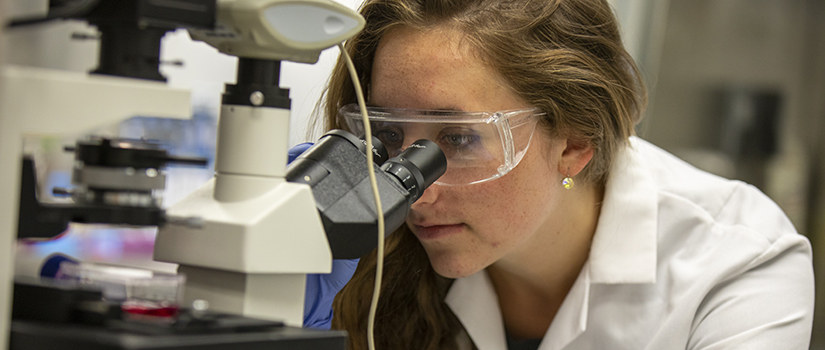Why Study Chemical Engineering?
The creation and use of chemicals, fuels, drugs, food and many other products involve expertise from chemical engineers. As a chemical engineer, you'll use engineering, chemistry, biology, physics, and IT principles to create processes and products that are safe, environmentally friendly, energy efficient and economical.
Chemical engineering is one of the best-paying engineering professions in the U.S. Chemical engineers are employed across a wide range of businesses by both large and small companies and work in a wide range of industries, including:
- Energy and Fuel: Explore for new reserves of oil and gas, process these into fuels and other useful chemicals.
- Green Energy: Develop new technologies like solar, batteries and fuel cells that are sustainable and more environmentally sound.
- Chemicals: Produce a range of advanced materials and specialty chemicals like lubricants, elastomers, composites, fragrances, polymers, and surfactants.
- Pharmaceuticals: Research and manufacture medicines and pharmaceutical therapies and ensure quality control.
- Biotechnology: Develop materials from biofuels to synthetic tissue and organic semiconductors.
- Food and Beverage: Formulate new flavors, provide more consistent texture and appearance, and design aseptic packaging to extend shelf life.
- Health and Safety: Minimize waste and make processes more efficient with sustainable raw materials.
- Microelectronics: Develop sensors and touchscreens; improve manufacturing of microchips and intricate circuitry via electroplating and etching.
Curriculum
Our chemical engineering curriculum provides a strong foundation in the core areas of chemical engineering and prepares you for employment in industry or for graduate school. It integrates the study of engineering, chemistry, physics, computer modelling, health and safety. Optional concentrations allow you to specialize in an area of interest.
Major subjects included in the chemical engineering curriculum include:
- Introduction to Chemical Engineering
- Chemical Process Principles
- Chemical Engineering Thermodynamics
- Chemical Engineering Fluid Mechanics
- Heat-Flow Analysis
- Mass Transfer
- Chemical Engineering Kinetics
- Computer Programming
- Computational Methods for Engineering Applications
- Process Safety, Health, and Loss Prevention
- Separation Process Design
- Chemical Engineering Laboratories
- Chemical-Process Analysis and Design
The curriculum also includes the Carolina Core, foundational math and science courses, and engineering, chemistry, technical and professional development electives. Independent study and special topics courses also provide unique learning opportunities.
Visit Undergraduate Curricula and Courses for additional details.
Concentrations
Chemical engineering students may enhance their degree by adding an optional concentration. It is possible to add any one of the following concentrations without taking additional classes by choosing specific engineering, technical, and chemistry elective courses that are already part of your degree requirements.
Learn to integrate chemical engineering principles and knowledge of biology to manipulate molecules of biological origin. Applications include the environment, agriculture, food production, biotechnology and medicine.
Study energy technologies that will enable society to move from an economy based on fossil fuels to one based on sustainable energy. Electives in microelectronics, photovoltaics, nuclear energy, and electrochemistry are included in this concentration.
This concentration recognizes your efforts to broaden your chemical engineering education with coursework in mechanical engineering, electrical engineering, computer science, and/or modeling and instrumental analysis.
Develop expertise in material science through the study of polymers, materials chemistry, corrosion, and/or semiconductors. This concentration will prepare you for a career making the stuff we use in our everyday lives better.
Take classes in environmental engineering, chemistry and environmental science. Consider this concentration if you want to work on problems of air and water pollution or solid and hazardous waste disposal.
Job prospects are particularly good for chemical engineering graduates with expertise in computational design and simulation. This concentration documents the skills you develop with computational tools, algorithmic design, and numerical modelling.
Graduate with Distinction in Chemical Engineering
The Distinction in Chemical Engineering option is available for qualified chemical engineering students. This program gives you the opportunity to conduct research, take related classes, and write an undergraduate thesis on a chemical engineering topic. A thesis committee will guide your work and prepare you to a present at a national meeting or the university’s Discovery Day. When you complete all requirements, you will be awarded “Distinction in Chemical Engineering” upon graduation. Discuss this option with your advisor before your sophomore year.
Capstone Design
The chemical engineering capstone design experience includes a team project on a real-world problem. You will study the economics and profitability criteria of chemical engineering projects related to typical corporate goals and objectives, and master process-flowsheet development and shortcut design techniques. Your comprehensive design project will include computer-aided design of chemical processes and written and oral presentations of your design solution.
Recent capstone design projects in chemical engineering include:
- Myrtle Beach Facility for the Solar Desalination of Seawater
- Methyl Tert-Butyl Ether Plant Design in Chocolate Bayou
- Facility Expansion for the Combined Production of Propylene Oxide and Tertiary Butyl Alcohol
- Plant Design to Produce Hydrogen from Methanol in Oklahoma City
- Ethylene Production from the Oxidative Dehydrogenation of Ethane using Process Intensification Methods
- Design of an N-Butyl Acetate Plant to be located at Lake Charles
Extracurriculars
Chemical engineering students participate in a variety of clubs including our student chapters of:
- American Institute of Chemical Engineers
- Electrochemical Society
- National Society of Black Engineers
- Society of Women Engineers
Undergraduate research opportunities in chemical engineering are available. Undergraduate researchers get involved on a volunteer, course credit, or paid position basis. Research areas include biological and medical systems, electrochemical engineering, materials and separations, catalyst design and evaluation, computational modelling and molecular engineering.
With other undergraduates in our college, chemical engineering students take full advantage of living-learning communities, mentorship opportunities, study abroad, intramurals, internships, just hanging out with friends, and more.
Visit Student Experience to learn more.
